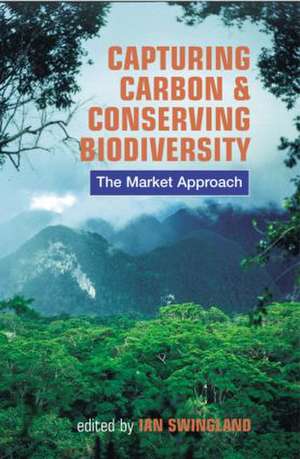Capturing Carbon and Conserving Biodiversity: The Market Approach
Editat de Ian Swinglanden Limba Engleză Hardback – apr 2003
Preț: 769.51 lei
Preț vechi: 1030.52 lei
-25% Nou
Puncte Express: 1154
Preț estimativ în valută:
147.24€ • 154.15$ • 121.84£
147.24€ • 154.15$ • 121.84£
Carte tipărită la comandă
Livrare economică 05-19 aprilie
Preluare comenzi: 021 569.72.76
Specificații
ISBN-13: 9781853839504
ISBN-10: 1853839507
Pagini: 392
Dimensiuni: 156 x 234 x 36 mm
Greutate: 0.75 kg
Ediția:1
Editura: Taylor & Francis
Colecția Routledge
Locul publicării:Oxford, United Kingdom
ISBN-10: 1853839507
Pagini: 392
Dimensiuni: 156 x 234 x 36 mm
Greutate: 0.75 kg
Ediția:1
Editura: Taylor & Francis
Colecția Routledge
Locul publicării:Oxford, United Kingdom
Cuprins
List of figures and Tables * About the Contributors * Preface Acknowledgements * List of Acronyms and Abbreviations * Introduction * Part 1: Carbon and Climate Change - Forests, Carbon and Global Climate * Changes in the Use and Management of Forests For Abating Carbon Emissions: Issues and Challenges Under the Kyoto Protocol * An Overview of a Free-Market Approach To Climate Change and Conservation * Potential Carbon Mitigation and Income in Developing Countries from Changes in Use and Management of Agricultural and Forest Lands * the Role of Multilateral Institutions * Electricity Generation: Options for Reduction in Carbon Emissions * Measuring, Monitoring and Verification of Carbon Benefits for Forest-Based Projects * Understanding and Managing Leakage in Forest-Based Greenhouse-Gas-Mitigation Projects * Part 2: Environmental Services - The Influence of Land-Use Change and Landscape Dynamics on the Climate System: Relevance to Climate-Change Policy Beyond the Radiative Effect of Greenhouse Gases * Economic, Biological and Policy Constraints on the Adoption of Carbon Farming in Temperate Regions * The Role of Sustainable Agriculture and Renewable-Resource Management in Reducing Greeenhouse-Gas Emissions and Increasing Sinks in China and India * Social Capital from Carbon Property: Creating Equity for Indigenous People * Species Survival and Carbon Retention in Commercially Exploited Tropical Rainforest * Animal Conservation, Carbon and Sustainability * Collateral Biodiversity Benefits Associated with 'Free-Market' Approaches to Sustainable Land Use and Forestry Activities * Developing Markets for Forest Environmental Services: an Opportunity for Promoting Equity While Securing Efficiency * Part 3: the Future Model - Carbon Sinks and Emissions Trading Under the Kyoto Protocol: a Legal Analysis * Protecting Terrestrial Ecosystems and the Climate Through a Global Carbon market * Designing a Carbon Market That Protects Forests in Developing Countries * Greenhouse-Gas-Trading Markets * Index
Notă biografică
The editor, Ian R. Swingland, is Emeritus professor of Conservation Biology at the Durrell Institute of Conservation and Ecology (DICE), and Director of Sustainable Forestry Management Ltd
Recenzii
'Mr Swingland and his co-authors make a compelling case that the best way to reduce the risk of any potential eco-disaster is to embrace market greenery.'The Economist'This book should be useful for those involved with policy, research, practical conservation or the business development of carbon markets.'Environment Business Magazine'This set of updated essays is a welcome addition.'The Times Higher
